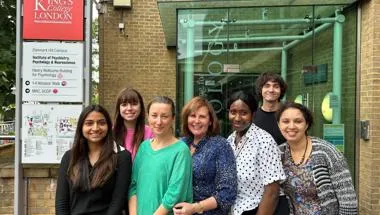
Jessica Steward
Research Assistant
Research interests
- Psychology
- Mental Health
Contact details
Biography
Jessica joined the Institute of Psychology, Psychiatry & Neuroscience (IoPPN) in September 2021. She holds a BSc in Psychology from Cardiff University (2018) and an MSc in Clinical Mental Health Sciences from University College London (2021). Jessica is a Research Assistant on the Shift Focus research study testing a new mobile app for young people presenting with high levels of worry. She also previously worked as a Research Assistant on a clinical trial testing online cognitive therapy for young people presenting with Post Traumatic Stress Disorder and as an Honorary Assistant Psychologist in the National Specialist Child and Adolescent Trauma Anxiety and Depression Clinic in South London and Maudsley NHS Foundation Trust.
Research Interests
- Digital psychological interventions for young people presenting with Generalised Anxiety Disorder and Post Traumatic Stress Disorder.
Research

Shift Focus
A study testing an online training designed for young people to help shift focus away from worry.
Project status: Ongoing

Cognition in Emotional Disorders and Resilience (CEDAR) Group
The Cognition in Emotional Disorders and Resilience (CEDAR) group’s research focuses on understanding both the mechanisms that maintain mental health difficulties and those that foster resilience. We use this knowledge to help us develop new interventions that target these mechanisms either in face-to-face therapy or via digital therapeutics.
Research

Shift Focus
A study testing an online training designed for young people to help shift focus away from worry.
Project status: Ongoing

Cognition in Emotional Disorders and Resilience (CEDAR) Group
The Cognition in Emotional Disorders and Resilience (CEDAR) group’s research focuses on understanding both the mechanisms that maintain mental health difficulties and those that foster resilience. We use this knowledge to help us develop new interventions that target these mechanisms either in face-to-face therapy or via digital therapeutics.
